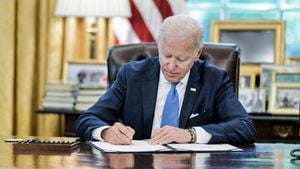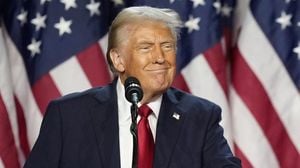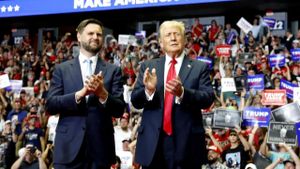The Rise of Right-Leaning Politics is shaking up Europe, bringing both shifts and challenges to the foreground. A coalition of right-wing parties is gradually asserting their influence over the European Union (EU), raising important questions about the future of EU politics and the region's socio-economic policy. Amidst growing political discord, various European nations are confronted with labor shortages, spurring efforts to attract foreign workers even as they indulge rising anti-immigrant sentiments from the far right.
At recent political events, key players like Ursula von der Leyen have taken center stage, especially concerning the appointment of hard-right commissioner Raffaele Fitto. Leaders from the major political groups, including the centre-right European People's Party (EPP), centre-left Socialists and Democrats (S&D), and centrist Renew, aligned to back von der Leyen’s new European Commission, securing approval for Fitto’s pivotal role. The compromise, albeit layered with tensions, is poised to drive negotiations on pressing issues such as defense, economic competitiveness, and environmental policies.
A focal point of contention remains the rising far-right parties, especially the Brothers of Italy, led by the charismatic Giorgia Meloni, who recently celebrated Fitto's confirmation as reflective of Italy's significant role within Europe. "His appointment showcases Italy's stature as one of the founding nations of the EU and its economic prowess," she asserted proudly. Yet, the position of far-right factions has incited unease among more centrist and progressive members of parliament, who worry about potential shifts away from pro-European values.
Concerns over the appointment of other nominees, particularly the controversial selection of Hungarian commissioner Oliver Varhelyi, underline the complex balancing act faced by the EU representatives. Varhelyi's track record under Hungary's nationalistic Prime Minister Viktor Orban has sparked significant protest. ``The handling of sensitive issues, including abortion and LGBTQ rights, are at stake; Varhelyi's stance on these topics raises persistent anxieties,`` expressed visibly dismayed lawmakers from the S&D party. Despite these fears, Varhelyi was recently confirmed, albeit with stripped responsibilities concerning sexual health, highlighting the growing influence of right-leaning politics.
Simultaneously, the repercussions of shifting political dynamics are vividly illustrated through individual nation policies, particularly labor immigration. With declining birthrates and aging demographics, many European countries find themselves at the crossroads of labor shortages and stringent immigration policies. Nations like Italy have acknowledged this paradox, engaging actively with foreign talents — even as its government, known for its strong anti-immigration rhetoric, pushes unchanged stances on who should be allowed entry.
Specifically, Italy's approach includes recruiting thousands of nurses from India, demonstrating the irony of far-right governments working to fill roles they publicly oppose. Italian Health Minister Orazio Schillacisaid revealed interesting statistics highlighting the paradox: 452,000 foreign entries anticipated from 2023 to 2025, against identified needs exceeding 833,000. Schillacisaid voiced optimism for the transition, recognizing India as home to over 3.3 million nurses willing to migrate.
Germany's scenario parallels Italy's, yet it carries its unique challenges. The country is positioning itself as inviting skilled foreign workers to address labor deficiencies, particularly through the implementation of its 'Opportunity Card' initiative. This scheme targets thousands of skilled workers, but it exists amid the loud backdrop of anti-immigrant rhetoric and calls for stringent border controls. Chancellor Olaf Scholz has boldly signed for increased visas for trained workers from target nations, even needing to balance this with rising pressures to reduce irregular immigration.
Meanwhile, the Netherlands strives to retain skilled laborers, emphasizing how major companies like ASML—responsible for manufacturing highly touted semiconductor components—rely on a diverse international workforce. ASML CEO Christophe Fouquet defended the necessity for migration; he remarked on the essence of talent diversity, stating, "Building our company with more than 100 nationalities has been fundamental for our performance. We need to sustain this."", reinforcing the urgent need for inclusive immigration policies.
Despite the harsh political discussions surrounding immigration, many European countries are unwilling to forego their economic vitality, leading to interesting dualities within governmental approaches. Political observers note this unmasking of phenomena where public immigration policies promote restriction, all the way to the surface-level winking at the need for workers.
A broad consensus emerges—Europe needs people. Yet grappling with the constantly growing right-leaning political sphere becomes the challenge at hand, necessitating detailed attention to avoid straying too far from the foundational European values of solidarity and inclusivity. With key players like von der Leyen and Meloni continuing to influence the EU's direction, the stakes are undoubtedly set high.
How far will right-leaning politics sail before they hit the rocks of reality—where the necessity for skilled foreign labor clashes with their populist agendas? The future is uncertain as the EU endeavors to balance these opposing forces on its increasingly turbulent political waters.



